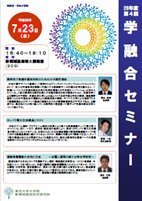AY2014 4th Gakuyugo Seminar
- Date&Time:
- Jul 23, 2014 16:40~18:10
- Venue:
- Large Lecture Room (2C0), New Frontier Science Bldg.

Molecular Design Guidelines for Organic Semiconductor Materials for Practical Use
Associate Professor Toshihiro OkamotoIn the printed and flexible electronics industry, which is expected to become the next generation of electronic devices, scientific understanding of organic semiconductor materials and innovations in molecular technology at a deeper level are required in view of the wide range of applications for circuit elements that will actually enable the formation of a huge market. In order to develop organic semiconductor materials that meet the above practical requirements, cross-disciplinary research is required, such as precise molecular design by computational science, development of low-cost synthesis methods by synthetic organic chemistry, understanding of molecular assemblies and development of control techniques by precise structural analysis, and control of thin films in solution processes and optimization of device structures by device engineering. In this talk, we will discuss the recent progress of our research. In this talk, I will introduce our recent work on bent pion-core organic semiconductor materials for practical use.

3D Protein Structure and Drugs
Project Associate Professor Kazuki Saito
Recent achievements in genome and proteome analysis have led to the discovery of various disease-related proteins. At the same time, advances in measurement and analysis methods have revealed the three-dimensional structures of many proteins. Although it would be nice if this structural information could be directly linked to the development of drugs for disease-related proteins, the actual work is not so easy. Protein structures are more flexible than we imagine. Recently, an alternative approach to direct structure-based drug design has emerged.

Objectives and Methods of Archaeological Excavation -New Archaeological Research between Japan and Russia
Associate Professor Masahiro Fukuda
The study of human history and environmental adaptation across the bordering countries of Japan and Russia has changed dramatically since the collapse of the Soviet Union and the beginning of this century. I have been involved in the excavation of archaeological sites between Japan and Russia, and have had to overcome a number of "barriers" in terms of research and analysis methods and historical awareness. The purpose of fieldwork is achieved by accumulating failures and alternative solutions. The methods and current status of transnational fieldwork will be introduced with practical examples from the front lines.

*The contents of this page were developed based on a machine translation.
